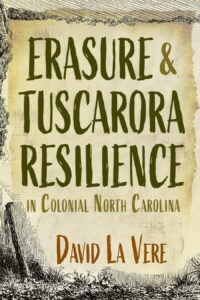NOTE: THIS WEBSITE IS A WORK IN PROGRESS. RESOURCES AND DATA ARE ADDED DAILY.
IMPORTANT: We are in urgent need of funding to keep this project alive and ensure its future. If you’re enjoying the site and see our vision for the project, please consider joining as a paid member or contributing to our crowdfunding campaign today. It is only with your help that we can continue this work.
Thanks so much for your support! – Jes
![]()
Erasure & Tuscarora Resilience in Colonial North Carolina
share:
Some buttons on this page link to external websites. If you visit one of our affiliate sites and make a purchase, I may receive a small commission at no extra cost to you. More info
- UPDATED: 6.29.2025
- status: to be worked, high-priority
- American History, Indigenous History, History, Populations, Indigenous Issues, Regional
- colonial America, resilience, cultural identity, erasure
author:
David La Vere
editor:
n/a
publisher:
date:
4.15.2024
ISBN:
9780815638360
pages:
304
notes:
contents:
description:
places:
peoples:
events:
CMOS:
author-date:

